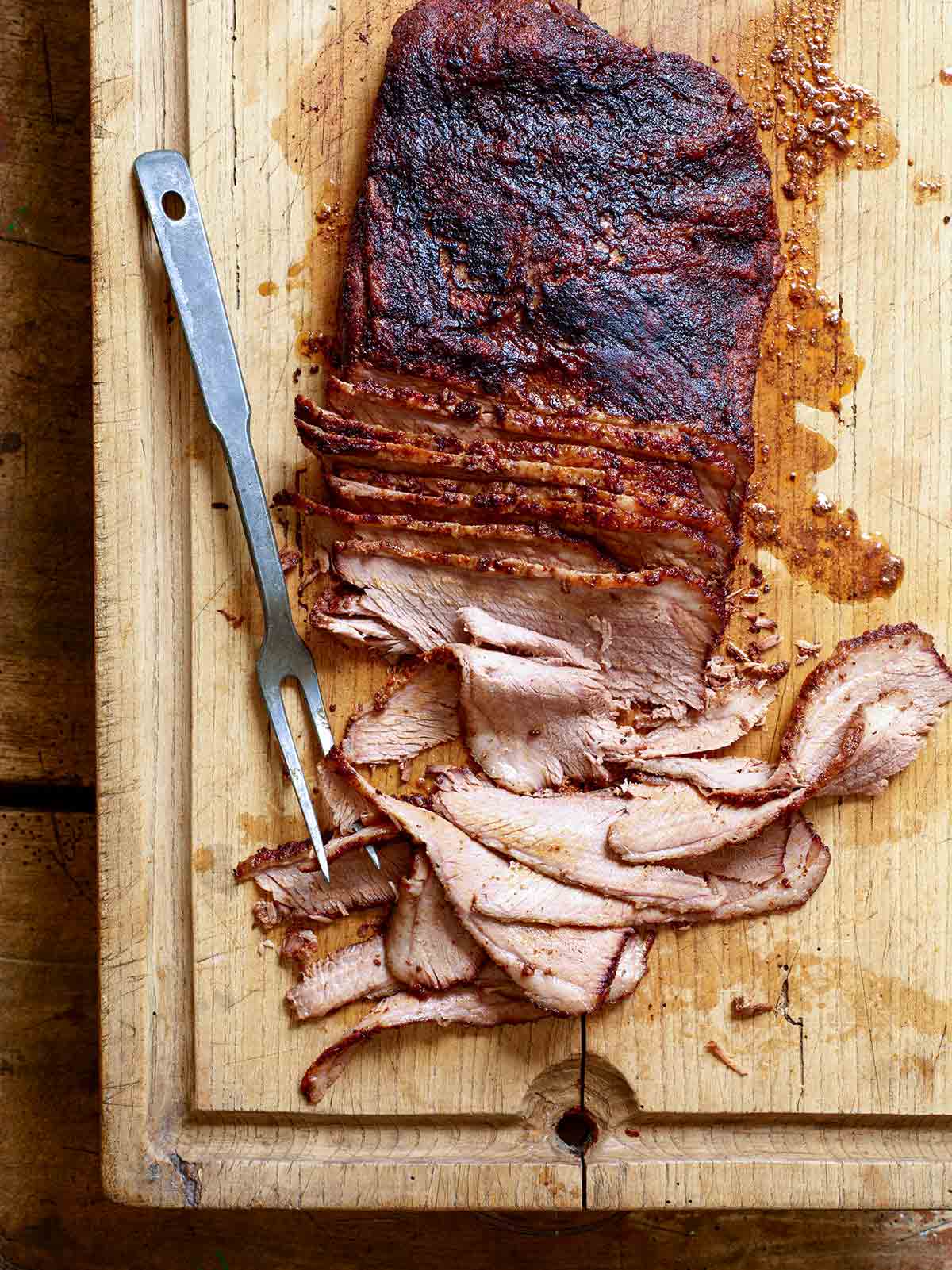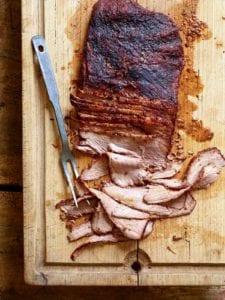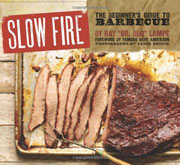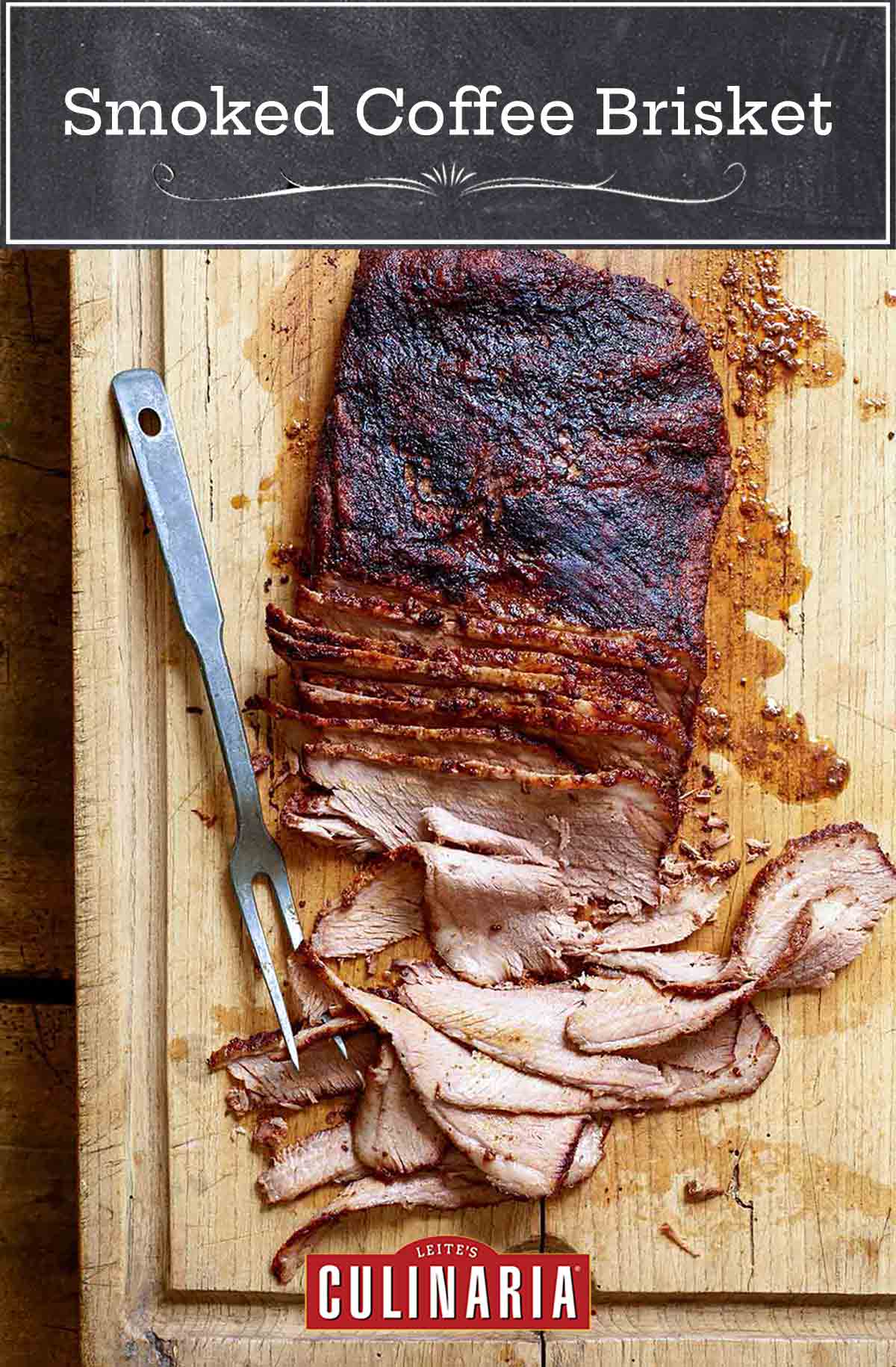
The flat cut of brisket makes for those long, beautiful slices that look so good on the plate. This cut has a lot less fat on it than a whole brisket, though, so it needs a little added moisture during the cooking process. Coffee adds a subtle flavor while helping keep things juicy as the brisket cooks itself to tenderness.
A flat-cut brisket such as this is a simpler piece of meat to cook than a big whole brisket, so this is a good place to start for someone new to cooking barbecue. Just don’t get one smaller than 5 pounds.–Ray Lampe
Smoked Brisket FAQs
Using an indirect heat source is a big part of brisket cooking technique. You can tame the flame by simply using a steel deflector or a big pan of water directly above the fire. Another way you can do this is by simply positioning the flames on one side of the brisket, then funneling the heat into the cooking chamber.
If none of these are possible, then you can actually just keep the food and the flame a good distance apart. Obviously, this is all dependent on the equipment you’re using.
As far as keeping the temperature low, you have a couple of options here too. Electric or gas is the simplest—just turn down the heat. Charcoal grills can be dealt with in two ways—either just build a small fire and feed it as needed. Otherwise, you can build a larger fire in one or two places and control the temperature with closed air vents to limit the oxygen.
A whole brisket is comprised of the flat and the point. The flat is the larger piece, and it’s long and thin with a thick fat cap on top of it. It’s most often sold as brisket.
A full brisket will also have the point, which is thicker and has more fat marbled through it. The point cut is often used for grinding hamburger meat due to its higher fat content.
You definitely want to include potatoes of some kind, whether masala smashed potatoes, scalloped potatoes, or Hasselback style. Other classic brisket sides include creamy coleslaw, grilled corn on the cob with chipotle butter, cider baked beans, and smoked mac and cheese.

Smoked Coffee Brisket
Equipment
- Smoker (optional)
Ingredients
- One (5- to 6-pound) flat-cut brisket, fat left on
- Your favorite store-bought or homemade BBQ rub
- 1/2 cup strongly brewed coffee, at room temperature
Instructions
- Prepare your cooker (gas or charcoal grill or barbecue smoker) to cook indirectly at 235°F (113°C), using hickory wood if you have a smoker.
- Season the brisket liberally on all sides with the BBQ rub. Cook the brisket, fat side down, for 1 hour. Then flip it fat side up and cook to an internal temperature of 160°F (71°C), another 3 to 4 hours.
- Place 2 very large sheets of heavy-duty aluminum foil, one atop the other, on your work surface, long side facing you. Fold the right half of the foil over the left half, crease, and unfold. Remove the brisket from the cooker and leave the heat on. Place the brisket, fat side up, in the center of the left half of the foil. Turn the edges of the foil up to create a lip and pour the coffee over the brisket. Fold the other half of the foil over the brisket and crimp the edges shut. (Be careful not to pierce the foil. If you do, don’t freak. Just start over, wrapping the brisket in foil all over again.)
- Return the foil-wrapped brisket to the cooker until it reaches 200°F (93°C). Begin checking the internal temperature of the brisket after 1 hour. When it’s ready, remove the brisket package from the heat, unwrap it, and let it rest for 30 minutes.
- Move the brisket to a cutting board. If desired, reserve the coffee mixture, skimming the fat from the surface of the liquid and serving the remaining juices as a sauce. Slice the brisket on the diagonal into 1/4-inch-thick slices.
- It's up to you if you want to serve the brisket straight from the cutting board or pile it on a platter.

Nutrition
Nutrition information is automatically calculated, so should only be used as an approximation.
Recipe Testers’ Reviews
I really liked having the coffee mixed with meat juices to use as a sauce. It adds a bit of richness and complexity, without being sweet at all. I made the brisket in my Big Green Egg. The accessory called a “plate setter” (not sure why they call it that) helps adapt the Egg for indirect cooking.
The rub calls for turbinado sugar, which is usually coarse-grained, and kosher salt, which is also coarse. I found that these two ingredients in the rub had a tendency to fall off the meat, while the finer ground ingredients adhered. I like to make my rubs with finer-grained salt and sugar to avoid this problem, and that’s what I’d do with this rub in the future.
The other thing I’d do differently in this recipe is to cook the smoked coffee brisket with the fat side up during the entire cooking time, instead of starting with the fat down and flipping it. The timing given in the recipe was pretty accurate for my setup, but since this can vary depending upon the nature of your smoker and the shape of your cut of meat, you’ll need to monitor the internal temperature as you go.
We love smoked food, so we had to try this smoked brisket recipe. The rub is a perfect blend of sweetness, saltiness, and spiciness. It’s absolutely beautiful. It’s one to use on all types of meats in the future.
The smoked coffee brisket was very tender but I think I should have cut down on the time. I used the full 4 hours and next time I’ll just use 3 hours and then wrap it in the foil. After 1 hour the temperature was already a little over 200°F.
The meat totally fell apart but was just a tad dry, but that was my fault as I really should have removed it earlier. Perhaps next time I’ll add a bit more coffee, too, as I didn’t taste it in the meat.













I soaked a Brisket using this very recipe. The only thing I did different was to soak the brisket over night in a can of beer. This is an awesome recipe and I suggest it to anyone who wants a succulent piece of meat. Super good recipe. 🙂
Barb, that is an incredible-looking piece of meat. Congrats. I think we have a master smoker in our midst!
Just a question: How does one check the internal temperature of the foil-wrapped brisket? Unwrap and then try to re-wrap without losing all the accumulated juices??
One could do that, Karen. Or one could insert the probe of a meat thermometer through the foil and into the brisket, as it’s pretty easy to ascertain just how thick the brisket is through the foil and hence when the probe has reached the center of the cut of beef.
Pray silence and be upstanding, ladies and gentlemen, for the smoked brisket.
Hah! (Uh, that was a silent laugh, mind you.) Love you, Ling Teo!
It was my most natural reaction to this most majestic of images.
Love that Ling! Must agree with Renee.